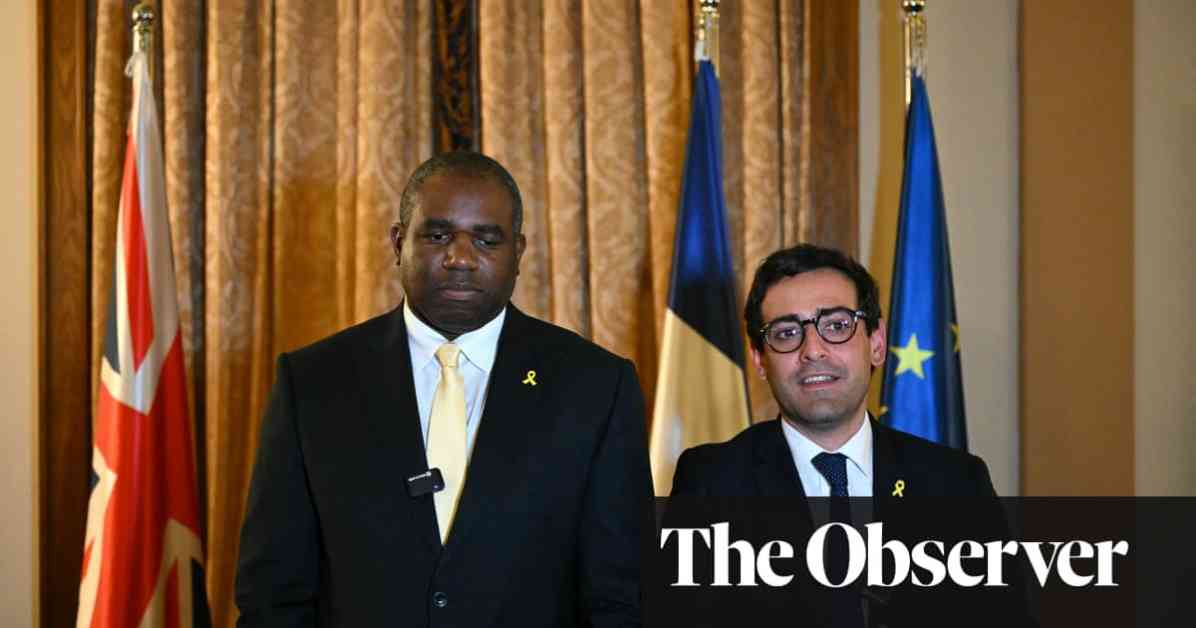The Rising Risk of Full-Scale Regional War in the Middle East
The foreign secretary, David Lammy, has issued a stark warning about the escalating tensions in the Middle East, cautioning that the region is on the brink of a “full-scale regional war.” Lammy’s concerns come at a time when international efforts are underway to ease the strained relations with Iran and broker a ceasefire agreement between Israel and Hamas.
Lammy, in collaboration with his French counterpart, Stéphane Séjourné, penned a joint article for the Observer, underscoring the urgent need to avert a potential catastrophe in the Middle East. They highlighted the growing cooperation between Britain and France in addressing the escalating crisis in the region, emphasizing the need for a concerted effort to prevent further escalation.
According to Lammy and Séjourné, the situation in the Middle East is becoming increasingly volatile, with the risk of a full-scale regional conflict looming large. They pointed to the intensifying fighting between Israel and Lebanese Hezbollah, coupled with Iranian threats of escalation, as key factors driving the heightened tensions in the region.
The recent Israeli military airstrike in Nabatieh province in southern Lebanon, which reportedly resulted in the deaths of at least 10 Syrian nationals, further exacerbated the already precarious situation. The strike, which Israel claimed targeted a Hezbollah weapons depot, underscored the escalating hostilities between the two sides.
International Efforts to De-escalate the Crisis
In response to the escalating tensions, international mediators have been working tirelessly to defuse the crisis and prevent a full-scale regional war. US Secretary of State Antony Blinken’s visit to Israel over the weekend was aimed at pushing for a ceasefire agreement between Israel and Hamas, with the hope of bringing an end to the hostilities.
Despite the ongoing efforts to broker a ceasefire, Lammy and Séjourné stressed the need for all parties involved to exercise restraint and prioritize diplomacy in resolving the conflict. They emphasized the devastating consequences of any further escalation, particularly in undermining the current Gaza ceasefire negotiations and perpetuating civilian suffering in the region.
The international community’s engagement in facilitating a peaceful resolution to the conflict reflects a renewed commitment to promoting stability and security in the Middle East. The joint efforts of Britain, France, and other key stakeholders underscore the collective determination to prevent a full-scale regional war and pave the way for a lasting peace in the region.
Challenges and Hurdles in Achieving Peace
Despite the concerted efforts to de-escalate the crisis, significant challenges remain in achieving a lasting peace in the Middle East. The diverging interests and demands of the parties involved, coupled with the complex geopolitical dynamics at play, have complicated the negotiations and hindered progress towards a resolution.
The recent round of ceasefire talks in Doha, which ended without a breakthrough, highlighted the deep-seated divisions and mistrust between Hamas and Israel. Both sides have raised concerns and requested amendments to the proposed ceasefire agreement, further complicating the already delicate negotiations.
The presence of Israeli troops on the Gaza-Egypt border, the sequencing of a hostage release, and the return of civilians from southern to northern Gaza are among the key sticking points in the negotiations. The reluctance of both parties to make concessions and compromises has stymied efforts to reach a consensus and achieve a sustainable ceasefire agreement.
Humanitarian Crisis and Civilian Suffering
Amid the escalating tensions and violence in the region, the humanitarian situation in Gaza has reached a critical juncture, with thousands of Palestinians bearing the brunt of the conflict. The mounting death toll, displacement of civilians, and worsening living conditions have underscored the urgent need for a humanitarian response to alleviate the suffering of the affected populations.
The Israeli military airstrikes in central Gaza, which resulted in the deaths of numerous civilians, including women and children, have raised concerns about the indiscriminate targeting of civilian areas. The displacement of over 170,000 people in central and southern Gaza, coupled with the shrinking humanitarian safe zones, has heightened the vulnerability of the civilian population.
The spread of polio in Gaza, the first case in 25 years, has further compounded the humanitarian crisis, highlighting the dire conditions faced by the residents of the besieged territory. The lack of access to essential services, including healthcare, clean water, and food, has exacerbated the suffering of the population and underscored the urgent need for international intervention to address the escalating humanitarian crisis.
In conclusion, the escalating tensions in the Middle East pose a grave threat to regional stability and security, with the risk of a full-scale regional war looming large. The international community must redouble its efforts to de-escalate the crisis, promote dialogue and diplomacy, and address the underlying causes of the conflict to pave the way for a lasting peace in the region. Only through a concerted and collective effort can we avert a humanitarian catastrophe and build a more secure and prosperous future for the people of the Middle East.












